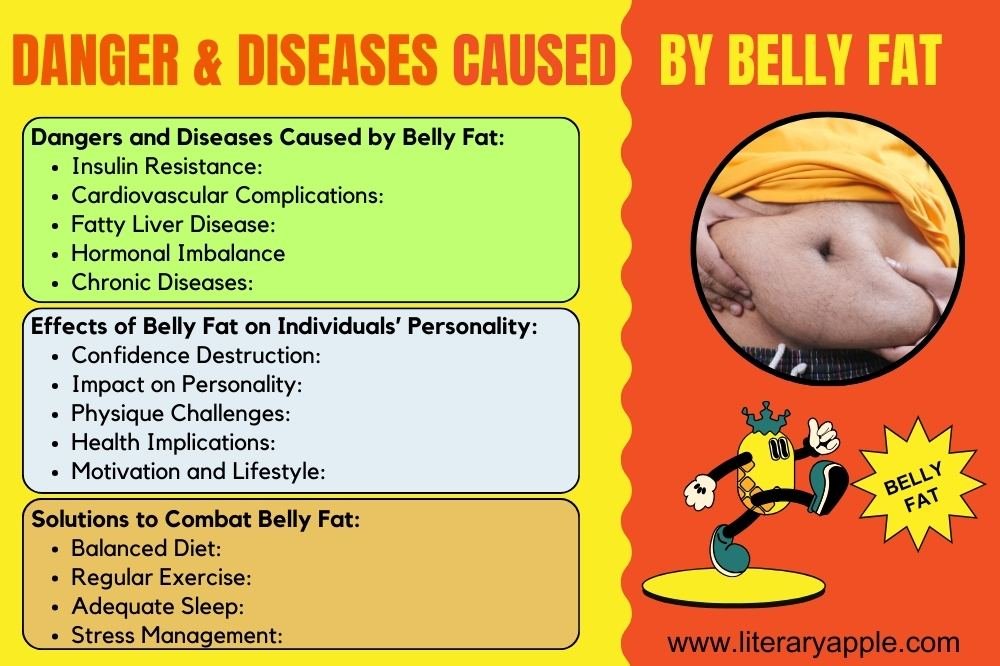Dangers and Diseases Caused by Belly Fat | Visceral Fat

Many individuals have belly fat and they ignore to shed it. Though some people try to focus on weight loss and they have serious concerns with obesity. Belly fat not only reshape your body look but it has many other serious concerns. Overall body weight management is important, it’s crucial to pay attention to the distribution of fat within the body. Visceral fat, often referred to as “belly fat,” poses significant health risks beyond our thinking. This article deals with the dangers and diseases associated with belly fat or commonly known as visceral fat. We will also try to address why it is essential to shed extra pounds of fat to live a healthy life.
Understanding Belly Fat
Visceral fat is the fat that accumulates around internal organs in the abdominal cavity, including the liver, pancreas, and intestines. Unlike subcutaneous fat, which lies just beneath the skin, visceral fat is hidden and not easily noticeable. It surrounds vital organs and can release substances that negatively impact overall health.
Dangers and Diseases Caused by Belly Fat
The effects of Belly fat, or visceral fat, goes beyond shaping you like a pear; it contributes dangers and diseases to our health. We will try to explore the intricacies of diseases caused by belly fat, it becomes evident that understanding and addressing these risks are very important for a healthier future.
Here are some serious concerns and dangers caused by belly fat
1. Insulin Resistance and Type 2 Diabetes
One of the primary dangers of belly fat is its association with insulin resistance. As visceral fat accumulates, it releases chemicals that interfere with the body’s ability to respond to insulin, leading to elevated blood sugar levels. This process lays the groundwork for the development of type 2 diabetes, a chronic condition with severe implications for overall health.
2. Cardiovascular Complications Caused by Belly Fat
Belly fat significantly contributes to cardiovascular problems. It has been linked to elevated blood pressure, abnormal lipid profiles, and atherosclerosis—the hardening and narrowing of arteries. This trifecta of issues increases the risk of heart disease, a leading cause of morbidity and mortality worldwide.
3. Fatty Liver Disease
The infiltration of fat into liver cells, a condition known as fatty liver disease, is a concerning consequence of excess belly fat. This can lead to inflammation, scarring, and compromised liver function. Left unaddressed, fatty liver disease can progress to more severe conditions, including cirrhosis.
4. Hormonal Imbalance Caused by Visceral Fat
Belly fat is an active endocrine organ, releasing hormones and cytokines. The excess production of cortisol, a stress hormone, can disrupt the delicate hormonal balance in the body. This imbalance may contribute to mood disorders, immune system suppression, and other health complications.
5. Increased Risk of Chronic Diseases
Visceral fat is strongly linked to the development of chronic diseases, including type 2 diabetes, heart disease, and certain cancers. The fat cells in the abdominal area release inflammatory substances and hormones that can disrupt the body’s normal functioning, contributing to the onset and progression of these diseases.
Effects of Belly Fat on Individuals’ Personality
The effects of Belly fat, or visceral fat, is not limited to diseases but it also affects you personality and confidence in many ways. Here are such few concerns.
1. Confidence Destruction
Carrying excess belly fat can take a toll on one’s confidence and self-esteem. The societal emphasis on body image can lead individuals with belly fat to feel self-conscious, potentially impacting their confidence levels.
2. Impact on Personality
Belly fat can influence how individuals perceive their own personalities and how they are perceived by others. The stigma associated with body weight may create psychological barriers, affecting social interactions and leading to feelings of insecurity. Recognizing and addressing these perceptions is essential for fostering a positive self-image.
3. Physique Challenges
The presence of belly fat can contribute to challenges in achieving and maintaining an aesthetically pleasing physique. Clothing may fit differently, and individuals might feel dissatisfied with their overall appearance. Understanding the impact of belly fat on physical appearance is crucial for those seeking a more toned and balanced body.
4. Health Implications
Beyond the cosmetic aspects, belly fat has direct health implications, as discussed in previous articles. It is linked to insulin resistance, cardiovascular problems, fatty liver disease, and hormonal imbalances. Acknowledging these health risks emphasizes the need for a holistic approach to well-being, considering both physical and mental aspects.
5. Motivation and Lifestyle
The challenges associated with belly fat can affect an individual’s motivation to adopt a healthy lifestyle. Feeling dissatisfied with one’s appearance may lead to unhealthy coping mechanisms such as emotional eating or a sedentary lifestyle. Recognizing these patterns and seeking positive outlets for motivation is crucial for long-term well-being.
Solutions to Combat Belly Fat
We have provided many solutions to shed extra pounds from your body accumulated in shape of belly fat or abdominal fat. Though here are a few guidelines that you can follow to reduce belly fat.
a. Balanced Diet
Adopting a balanced diet is the first strategy that shows your concern regarding belly fat. Emphasize whole foods, including fruits, vegetables, lean proteins, and whole grains. Whole foods have no side effects and promote your overall health. Secondly limit the consumption of processed foods, sugary beverages, and saturated fats. You overall health is linked with your diet. Take it serious.
b. Regular Exercise
Stay active to make your body healthy. Who is not familiar with the benefits of doing exercises but laziness prevails and many people become couch potato. Do smart exercises, both aerobic exercises and strength training, and make a proper routine that you spare at least 40 minutes workout to keep your body active. Exercise not only burns calories but also helps reduce visceral fat and improve metabolic health.
c. Adequate Sleep
Adequate sleep is as important as a proper diet. Prioritize sufficient and quality sleep, as inadequate sleep is associated with weight gain and abdominal fat accumulation.
d. Stress Management
We have discussed the stress and its effects on body like accumulation of belly fat. (You can read it for detailed knowledge). In nut shell implement stress-reduction techniques such as meditation, yoga, or deep breathing exercises to manage cortisol levels and mitigate the impact of chronic stress.
Conclusion
In conclusion, the dangers of belly fat extend beyond aesthetic concerns, impacting physique look and overall health. Understanding the link between visceral fat and various diseases underscores the importance of adopting a holistic approach to health. By making informed lifestyle choices, including a balanced diet, regular exercise, sufficient sleep, and stress management, individuals can not only reduce belly fat but also safeguard their long-term health. Prioritizing these strategies is an investment in a healthier future, free from the perils associated with excess belly fat.


You May Also Like

Cosmelan Peel Treatment
20/08/2022
Fruits to Eat to Reduce Stomach Acidity
20/08/2023